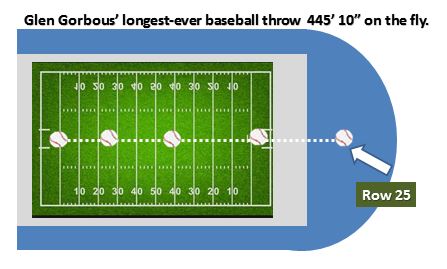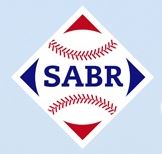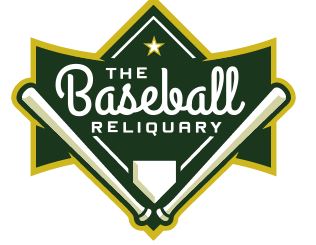Those of you who have been following Baseball Roundtable are likely familiar with the tale of actor Chuck Connors – who gained fame as Lucas McCain the television series “The Rifleman.” Connors, who won a Golden Globe Award (Best Television Performer) for the part he played in The Rifleman also played first base for the Chicago Cubs, forward and center for the Boston Celtics and was drafted by the NFL Chicago Bears.
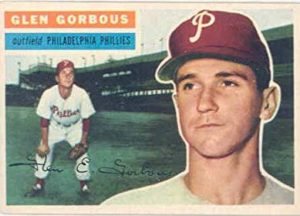 This post, however, is not about the multi-talented Chuck Connors (for his full story, click here). It is about a different kind of “rifleman” – former MLB outfielder Glen Edward Gorbous, who has (since 1957) held the record for the longest-ever baseball throw (Guinness Book of World Records).
This post, however, is not about the multi-talented Chuck Connors (for his full story, click here). It is about a different kind of “rifleman” – former MLB outfielder Glen Edward Gorbous, who has (since 1957) held the record for the longest-ever baseball throw (Guinness Book of World Records).
Canadian-born Gorbous – a 6.-2”, 175-pound outfielder, had neither a long nor spectacular baseball career; but his hardball skills did get him into the Guinness Book of World Records. His record-breaking throw, in fact, took place when he was just 26-years-old – but had already played his final major league game and was just one season away from his last professional campaign. Gorbous began his pro-career as a 19-year old (1950), signed out of a Dodgers’ tryout camp. Over his first five (minor league) seasons, Gorbous played in 593 games, hitting .290 with 39 home runs. In 1953, he collected 204 hits (.336 average) for the Single A Pueblo Dodgers and began to show some power, reaching double digits in home runs (11) for the first time. The following season, promoted to Fort Worth of the Double A Texas League, Gorbous hit .283-16-71 (with ten steals) – punching his ticket to the big leagues (but not with Brooklyn).
The Reds plucked Borbous from the Dodgers in the November 1954 Rule Five Draft. He opened 1955 on the Reds’ MLB roster, but was traded to the Phillies (in a multi-player deal) on the last day of April (after appearing in just eight games for Cincinnati). He spent the remainder of 1955, 1956 and opening days of the 1957 season with the Phillies, but seemed over-matched against major league pitching – putting up a .238-4-29 stat line in 117 games.
Traded by the Phillies to the Cardinals in May of 1957, Gorbous was sent down to the Double A Omaha Cardinals – where he was playing when he set the baseball throw record in a pregame exhibition.
At that time, the record for a baseball throw was 445 feet-one inch, held by a player named Don Grate (more on Grate in a bit). Gorbous was always willing to show off his rifle arm and teammates urged him to make a run (throw) at Grate’s mark. On August 1, 1957 – throwing from the right field corner toward the left field corner – Gorbous launched one (reportedly his fourth throw) 445 feet-ten inches, setting a record that still stands.
Just how remarkable was that throw? Here’s some perspective. If Gorbous was throwing from the goal line of a football field, the ball would have gone through the uprights at the far end, across the 45-50 feet of space between the end zone and the grandstand and landed (on the fly) among the spectators in Row 25.
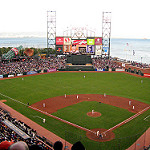
Photo by PugnoM 
From a more baseball-related perspective. If Gorbous had thrown from home plate, down the right field line, in the San Francisco Giants’ AT & T Park, the toss would have cleared the right field fence, the 24-foot high Willie Mays Wall and the walkway behind it – splashing down among the kayaks about 75-80 feet (the length of a semi-truck and trailer) out in McCovey Cove. Looked at another way, Borbous throw, if made from home plate, would easily clear the center field wall in any of MLB’s thirty ballparks.
Gorbous, by the way, played 97 games for the Omaha Cardinals, hitting .243, with just three home runs and 20 RBI and found himself back in the Dodger system (Spokane of the Triple A Pacific Coast League), where he hit .291 in 11-59 in 132 games in his last pro season.
For Minnesota-based readers, especially fellow members of the Halsey Hall Chapter of the Society for American Baseball Research, the record broken by Glen Gorbous was previously held by former Minneapolis Miller Don Grate. In an August 27, 1953, pregame exhibition at Metropolitan Stadium in Bloomington (MN), Grate uncorked a throw of 445 feet-one inch (breaking his own record of 443 feet-3.5 inches, set in 1953, while Grate was a member of the Chattanooga Lookouts). Notably, Halsey Hall both officiated the event.
Grate, like “The Rifleman” in the opening of this post, was a multi-sport athlete – playing for both the Phillies of the National League (pitcher, seven appearances, 1945-46) and the Sheboygan Redskins of the National Basketball Association (forward/guard, two games, 1949-50 season). Grate, who lettered in both baseball and basketball at The Ohio State University, is a member of the OSU Varsity O Hall of Fame.
Chuck Connors and Ted Williams
One final story for this post, this one shared on the “Our Chuck Connors” website … ourchuckconnors.com
After a 1946 appearance – reciting Casey at the Bat – representing the Celtics at the Boston Baseball Writers Dinner, Connors was approached by Ted Williams (fresh off his 1946 MVP Award) who told him: “Kid, I don’t know what kind of basketball player you are, but you ought to give it up and be an actor.”
Teddy Ballgame always did have a good eye.
While digging into the Gorbous “Guinness” entry, I came across of wonderfully detailed look at the full evolution of the longest-throw record. If interested in knowing even more on this topic, you should visit the J.G. Preston Experience here.
Primary Resources: Baseball-Reference.com; Guinness Book of World Records; Society for American Baseball Research.
BASEBALL ROUNDTABLE MAKES TOP 100 BASEBALL BLOG LIST
 Baseball Roundtable has made the Feedspot list of the Top 1oo Baseball Blogs. To see the full list, click here.
Baseball Roundtable has made the Feedspot list of the Top 1oo Baseball Blogs. To see the full list, click here.
I tweet baseball @DavidBBRT
Follow/Like Baseball Roundtable’s Facebook Page here. More baseball commentary; blog post notifications; PRIZES.
Member: Society for American Baseball Research (SABR); The Baseball Reliquary; The Negro Leagues Baseball Museum.
